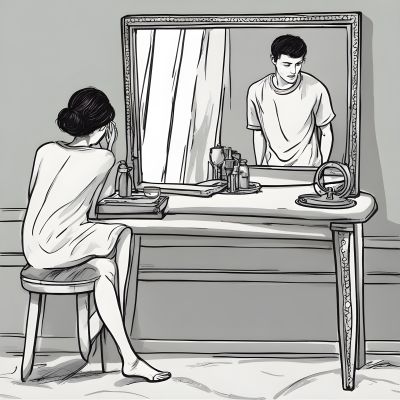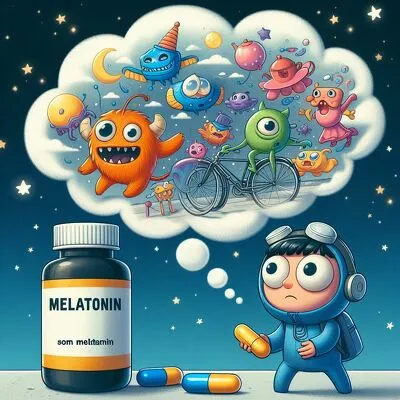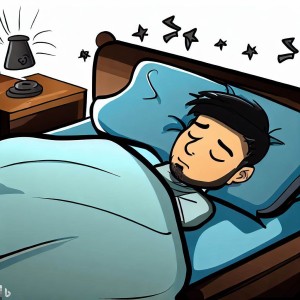Reflecting on the Mystery: The Dream of Looking in a Mirror and Seeing Someone Else

Dreams possess profound symbolic meanings that intrigue psychologists and dream enthusiasts alike. Among these enigmatic scenarios is the dream of looking in a mirror and seeing someone else. This phenomenon raises questions about identity, self-perception, and the unconscious mind. Let’s explore the potential interpretations and the psychology behind this baffling dream experience.
I. Introduction
Dreams, the mysterious narratives that play in our minds during sleep, have long captivated humanity’s attention. Their analysis provides a window into the subconscious, revealing insights that may otherwise remain hidden.
A. Importance of dream analysis
From ancient civilizations to modern psychology, dream analysis has been a vital tool in understanding the human psyche and emotions. By interpreting our dreams, we can gain a better understanding of our desires, fears, and unresolved issues.
B. The intrigue of mirror dreams
Mirrors in dreams, particularly the unsettling experience of seeing an unfamiliar reflection, are a captivating subject. They not only reflect our self-perception but also delve into the deeper layers of our identity.
II. Understanding the Dream Phenomenon
Dreams serve as a reflection of our subconscious mind, combining our experiences, emotions, and even unprocessed thoughts.
A. Role of mirrors in dreams
Mirrors throughout history, have been seen as gateways to other dimensions or realms. In dreams, they often symbolize introspection, self-awareness, and sometimes even a confrontation with aspects of oneself.
B. General symbolism of seeing oneself in dreams
Seeing oneself in a dream can be a metaphor for self-reflection, self-evaluation, or even self-criticism. It forces us to confront our true selves beyond the facades we often present to the world.
III. Interpreting the Dream of Looking in a Mirror and Seeing Someone Else
This particular dream scenario has various interpretations, each providing a different perspective on its meaning.
A. Psychological perspectives
Identity and self-perception: The unfamiliar reflection might represent how one perceives oneself or how one wishes to be seen by others.
Facing suppressed emotions or memories: The unfamiliar face could symbolize a part of oneself that has been denied or suppressed.
B. Cultural perspectives
Mirrors in folklore and myth: Many cultures view mirrors as portals or tools of divination, where the unfamiliar reflection could be an ancestor or a spirit guide.
Collective unconscious theories: The dream could be tapping into a shared set of symbols or archetypes that are common across different cultures.
C. Common scenarios and their potential meanings
Seeing a deceased loved one: This could indicate a desire to reconnect or unresolved emotions related to that individual.
Seeing a stranger: This might symbolize unknown aspects of oneself or upcoming changes in life.
Seeing a younger or older self: This can represent regret, nostalgia, or anxieties about aging and life’s impermanence.
IV. Factors Influencing Such Dreams
While the root cause of such dreams can vary, certain factors can influence their occurrence.
A. Current life events and stressors
Major life changes, challenges, or significant decisions can trigger dreams that focus on identity and self-reflection.
B. Past traumas or unresolved issues
Unprocessed emotions or traumas can manifest in dreams as unfamiliar reflections, symbolizing parts of oneself that need healing or acknowledgment.
C. External stimuli and their influence
Sometimes, external factors like movies, books, or conversations can influence the content of our dreams, leading to the incorporation of unfamiliar faces or scenarios.
V. FAQs
Q: How does numerology connect with the dream of looking in a mirror and seeing someone else?
A: Numerology, the study of the spiritual significance of numbers, can offer insights into dreams. The dream of seeing someone else in the mirror might be connected to the number “2”, symbolizing duality, partnership, and reflection.
Q: Can specific life path numbers be more prone to having mirror dreams?
A: Yes, individuals with life path numbers that emphasize introspection or duality, like 2 and 7, might be more susceptible to such dreams due to their inherent nature of self-reflection and spiritual search.
Q: Does the age of the person you see in the mirror have numerological significance?
A: Absolutely. If you see a younger or older version of yourself or someone else, the age might have a specific numerological meaning. For instance, dreaming of a 9-year-old might be related to the numerological significance of the number 9, which denotes completion and spiritual enlightenment.
Q: Are there numbers that amplify or suppress the meaning of the dream of looking in a mirror and seeing someone else?
A: The number “11”, being a master number, can amplify the spiritual significance of the dream. Conversely, a number like “5”, associated with change and instability, might suppress or alter its interpretation.
Q: Which numbers are most compatible with the dream of looking in a mirror and seeing someone else?
A: Numbers “2”, “7”, and “11” are most compatible due to their association with introspection, duality, and spiritual insight, respectively.
Q: What does it mean if you see another person in your dream?
A: Seeing another person in your dream, especially in a mirror, often represents aspects of yourself, whether it’s traits you possess, wish to possess, or even ones you deny or suppress.
Q: What does it mean when you dream of looking different in the mirror?
A: Dreaming of looking different in a mirror can symbolize personal transformation, self-perception, or grappling with identity issues.
VI. Conclusion
Dreams, particularly those involving mirrors, hold the potential to unravel the layers of our subconscious.
A. The importance of personal interpretation
While there are general interpretations, every individual’s dream experience is unique. It is paramount to reflect personally on what the dream means to you.
B. The quest for self-understanding through dreams
Dreams act as a bridge to understanding deeper aspects of oneself, driving introspection and self-awareness.
C. Encouraging further exploration and research
The study of dreams and their connection with other fields, like numerology, offers endless opportunities for discovery and personal growth.
VII. Suggested Readings
Embarking on a journey of dream exploration? These books can provide deeper insights:
- “The Interpretation of Dreams” by Sigmund Freud: A foundational work on dream analysis by the father of psychoanalysis.
- “Man and His Symbols” by Carl Jung: A dive into the symbolic language of dreams and the collective unconscious.
- “The Complete Book of Numerology” by David A. Phillips: An exploration into the world of numbers and their spiritual significance.
- “Mirror Work: 21 Days to Heal Your Life” by Louise Hay: A guide to using mirrors for personal reflection and transformation.
- “Dreams and What They Mean To You” by Migene González-Wippler: A comprehensive guide on dream interpretation and symbolism.
Engage with these works to further your understanding and decode the intricate patterns and symbols of your dream world.






